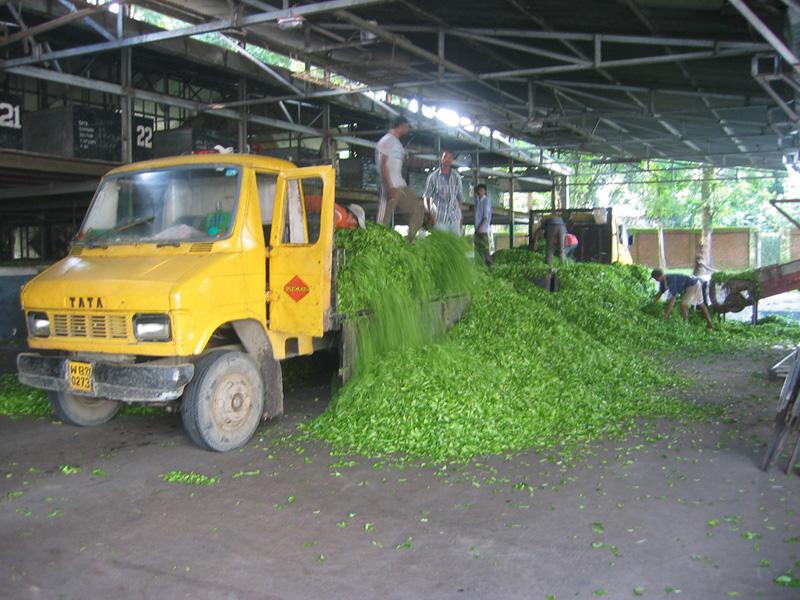COVID-19 in Rural India XLII: How Sinking Prices Doom Farmers in Khauchandpara of West Bengal

The Tea Leave Processing/ Representational Image
This is the 41st report in a series that provides glimpses into the impact of COVID-19-related policies on life in rural India. The series, commissioned by the Society for Social and Economic Research, comprises reports by various scholars who have been conducting village studies in different parts of India. Most of the reports have been prepared on the basis of telephonic interviews with key informants in their study villages.
This is a report from Khauchandpara village, which falls under the Chhota Salkumar Gram Panchayat and the Falakata Community Development Block. The village is located in the Alipurduar District of Northern West Bengal, which shares an international border with Bhutan and a state boundary with Assam. The village is located in the Dooars region among the foothills of the Bhutan Himalayan range. The village also shares a boundary with the famous Jaldapara National Park on the Eastern side. The nearest market is four km away in Umacharanpur-9 mile and has banks, an ATM, a high school, a daily vegetable market, a health sub-centre and a post office. The nearest hospital and college are in the Falakata block town, almost 18 km away from Khauchandpara.
I carried out a series of telephonic interviews with respondents in Khauchandpara between May 10 and 15 to assess the impact of the lockdown on them. My respondents include e-rickshaw drivers, vegetable sellers, vendors, farmers, family members of migrant workers, tea garden workers, and non-timber forest product gatherers.
I know the respondents in my personal capacity and also had the opportunity to interact in person with a few of them in the course of my work with an organisation carrying out relief work during the lockdown.
The impact of the lockdown on agriculture and the village economy
According to the Census of India (2011), Khauchandpara had a total of 1,151 households, and the total population was 5,222, with a sex ratio of 931 females per 1,000 males. The literacy rate of Khauchandpara was 61.71%, which was lower than the state and national averages. The village is mainly inhabited by various Scheduled Caste and Scheduled Tribe communities. The Scheduled Caste communities are the Namasudras, Dhobis, and Rajbanshis. Whereas, the Mech or Bodos, Santhals, Oroans, and Mundas are the dominant Scheduled Tribe communities in this village.
The Scheduled Caste and Scheduled Tribe communities together form 84.25% of the total population of the village. The Scheduled Caste communities account for 52.54% and the Scheduled Tribe communities account for 31.71% of the total population of the village.
There were around 2,200 workers in the village in the Census year. The economy of the village is mainly based on agriculture, small business, and non-timber forest products. The villagers of Khauchandpara cultivate paddy, wheat, mustard, potato, corn, chilly, tomato, cabbage, and other crops. The villagers also cultivate plantation crops like tea and betel nut (arecanut) and cash crops like jute.
The lockdown was declared during the peak harvesting season for rabi crops like potato, tomato, chili, ladies’ fingers (okra) and radish. It was reported that farmers dumped harvested tomatoes, okra, and green chili by the roadside as the prices they were offered for these would not even have covered the cost of transporting the vegetables. This region is known for potato cultivation, and the harvested crop is sold mainly in Assam and other North-eastern states of India. During the lockdown, potato farmers were compelled to sell their crops at very low prices in order to repay loans taken from moneylenders.
Thirty-two-year old Arjun Das owns and operates an electric rickshaw; his family of five is dependent on his earnings from the e-rickshaw. Since the lockdown was announced, he has been unable to earn an income. He purchased vegetables from farmers using his savings and opened a small vegetable stall in the local market. But even this does not earn him enough, as he says, "the vegetables are very cheap here, even then there are hardly any people to buy as people have very little money in hand".
One of the major sources of employment for the village is the export of vegetables and livestock products from neighbouring villages to the various markets of Bhutan through the Jaigaon-Phuentsholing corridor. The Jaigaon market, located approximately thirty-four km away from Khauchandpara, is a major hub for trade with Bhutan, supplying electrical and electronics equipment, hardware, tyres, tea, garments, medicines, personal grooming and hygiene products, bulk food grains, small vehicles, motorbikes and iron, and steel products. Bhutan in turn exports dolomite, cement, stone chips, potato, packaged food, oranges, and cardamom to India. The Bhutanese government sealed the country’s borders after the first COVID-19 case was detected on March 6. Consequently, vendors from Khauchandpara who used to collect poultry, vegetables, fish, milk, and other products from the nearby villages to sell in the Jaigaon market have lost their source of income.
Further, many migrant labourers from Khauchandpara and nearby villages work on construction sites in Bhutan. The daily wage rate in Bhutan for unskilled labour is Rs 450 to 500 and the wage rate for skilled labour is Rs 600 to 650; these are much higher than the daily wage rates offered in the village (Rs 300 for unskilled labour and Rs 450 for skilled labour). Many people from other villages in the Chhota Salkumar Gram Panchayat have also lost employment in Bhutan, and a few of them have not been able to return from their place of work to their respective villages.
Since the supply chain to the markets of Bhutan has broken down due to the lockdown, farmers in the village are not getting the usual prices for their produce. This situation became worse after the Assam-Bengal border was also partially sealed in mid-April. Farmers were forced to sell their produce at low prices in local markets. For example, potatoes were sold at Rs 10 per kg and tomatoes Rs 5 per kg a few weeks into the lockdown. These prices were almost half of what they had been before the lockdown was declared.
The Umacharanpur market is the nearest daily market for the villages of Khauchandpara, Badaitari, and Umacharanpur. After the Tablighi Jamaat incident came to light, access to the market was restricted using barricades as there were reportedly people from the region who had attended the religious congregation at Nizamuddin, Delhi. A new vegetable market was subsequently started on a vacant plot a few hundred meters away from the old market. Shibashish Mandal (58) from Khauchandpara runs a small grocery store in a rented room in the old market. According to him, "There were already fewer customers in the market due to lockdown, and since the new market was opened, hardly there is any customer in this market now. I have to pay rent for this shop, and I have to earn for my family. It has become very difficult for me now to feed the four members of my family."
The impact on betel nut and tea gardens
The betel nut (arecanut) gardens are another important part of the village economy in Khauchandpara. A significant amount of cultivable land is used to grow betel nut. It is one of the major cash crops of this village and is harvested and sold once a year during the months of March and April. According to the villagers, wild animals like elephants, pigs, and monkeys from Jaldapara National Park frequently raid the fields at night and destroy crops like paddy, potato, corn, and other vegetables. As these incidents have increased in frequency in recent years, the villagers opted to cultivate betel nut as a less vulnerable alternative.
Parimal Ray (39) grows betel nut on one acre of land. The lockdown was announced in the midst of this year’s harvesting season. Although he had managed to sell his crops to a local betel nut processing factory, he did not get any cash. "The chataal (betel nut processing unit) owner told me that he could not give any money until he manages to export the processed nuts to the markets of Assam once the lockdown conditions are lifted. " He also reported that he had no option but to sell the nuts to him as delaying harvesting them could affect productivity in the upcoming season.
There are also two large tea plantations in the village, Khauchandpara Tea Estate and Madarihat Land Project (MLP). The MLP garden owned by Duncans Industries Limited is spread over three villages: Khauchandpara, Umacharanpur and Madhya Madarihat. The MLP garden has been abandoned by the management since 2015. The future of 975 permanent workers of Madarihat Land Project (MLP) and their families remains undecided. Meanwhile, the workers have encroached the 250 hectares owned by the Madarihat Land Project and are selling the green leaves to the bought-leaf factories.
Given the crisis in the tea plantations since the early 2000s, a large number of young people from the tea plantations of North Bengal have migrated to cities in search of work. They are largely employed in the states of Kerala, Maharashtra, and Gujarat in construction, textile mills, and restaurants. A few of them managed to return to the village before the lockdown was announced, but the majority are still stuck where they work, which has been a source of anxiety and fear for their families.
Also read: COVID-19 in Rural India-XXXV: How Assam’s Atugaon Is Coping With Lockdown
When the nationwide lockdown was announced on March 24, work was suspended in the tea plantations of North Bengal. The plantation owners' associations had appealed to the state and the central governments to allow work with 25% workforce as they were in the middle of the first harvesting season (known as "first flush") the most productive and profitable season of tea plucking in a year. Tea plucked during the first flush season is the finest tea that is usually in high demand for export. The tea plantations of North Bengal were reopened on April 13 in the midst of the nationwide lockdown. Labourers were compelled to join work as neither the plantation owners nor the state had agreed to bear the responsibility of providing them rations and paid leave.
For instance, Anjali Oroan (48) is a woman from the Adivasi community who works as a labourer in a tea plantation in Khauchandpara. A few years ago, her husband died of liver failure brought on by alcoholism, and she has four children to support, three of whom are of school-going age. Her eldest son migrated to Kerala, and Anjali depends on his remittances as well as her wages from working on the tea plantation to manage her household.
Government Assistance and the Public Distribution System
The state government had promised to provide free rations till September 2020 to needy families according to their ration card category. However, West Bengal has witnessed several protests against ration dealers, with beneficiaries complaining that the system is defective. Several families were excluded from the PDS as they do not have the digital ration cards introduced recently by the government. Consequently, thousands of villagers were seen queuing outside the Food Supply Office in the Block Office at Falakata to apply for new ration cards or to update their old cards. Although a temporary barricade of bamboo was put up and a few civic volunteers were deployed to maintain the crowd by the police force, social distancing was not followed. A few people who do not have ration cards were given temporary coupons to collect ration from PDS shops.
Uttara Karjee (36), a tribal woman from the Bodo community, lives with her three children and physically challenged husband in a cottage near the forest. She collects non-timber products from the forest and sells them locally to earn an income. She has been unable to engage in this activity owing to the local market being shut down when the lockdown began and has thus lost her key source of income. A primary school near her home used to provide lunch to her children under the mid-day meal scheme. Since the lockdown began, the school has provided a few kg of rice and potatoes to her family as per the mid-day meal guidelines issued by the state government but this has proved insufficient.
The central government had announced that three LPG cylinders would be given to each household under the Ujjwala Yojana, subsidized through the banks. This too has created long queues in front of the bank counters and a temporary counter that was created to deal with a large number of people.
A significant number of villagers of Khauchandpara have job cards under the Mahatma Gandhi National Rural Employment Guarantee Act (MGNREGA) scheme but work under this scheme was temporarily suspended during the lockdown. Panchayat officials in the village reported having received instructions from state officials to resume work under MGNREGA while following the guidelines and instructions of the health department.
Concluding Remarks
Fear of infection and the imposition of the lockdown have brought life in the village to a standstill. The lockdown and the loss of income it has brought have intensified the vulnerabilities of villagers who were already afflicted by poverty and deprivation. The closing of the international border with Bhutan and the state border with Assam have meant that a large number of villagers are left with no work. Several weeks into the lockdown, the PDS has not reached all vulnerable groups and work under the MGNREGA scheme has not yet started. In the absence of work and opportunities to earn income, the villagers face impending starvation and hunger.
The author is a Senior Research Fellow in Department of Humanities and Social Sciences, Indian Institute of Technology Guwahati. He was born and raised in Khauchandpara and has travelled there to undertake fieldwork for his doctoral thesis in the tea plantations located close to the village as well as later.
Also read: COVID-19 in Rural India - XL: Impact on Rural Workforce in Bihar’s Bharri, An Update
Get the latest reports & analysis with people's perspective on Protests, movements & deep analytical videos, discussions of the current affairs in your Telegram app. Subscribe to NewsClick's Telegram channel & get Real-Time updates on stories, as they get published on our website.
























